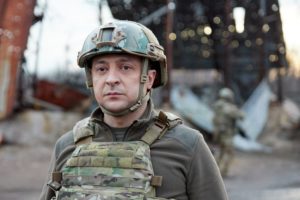
When we sing Robert Burns’ “Auld Lang Syne” on New Year’s Eve, do we really understand what it’s about? The archaic Scots language tends to obscure the meaning, and most of us only ever hear the first verse and chorus in any case. Still, we get that it’s full of longing for old friends and days gone by. The older I get the more I have to look back on, and the more this song affects me.
You have your future ahead of you. Mine is behind me.—Yogi Berra
The end of one year and the beginning of a new one is a good time to look back and take stock before we move forward. What happened during the year? What have we accomplished? Whom and what are we grateful for? Whom and what have we lost? What have we learned? What do we hope for in the new year?
I only dread one day at a time.—Charlie Brown in Charles Schulz’ Peanuts
Ukraine

President Zelenskyy addressed Congress on 21 December.
Vladimir Putin positioned more than 150,000 troops on Ukraine’s borders, then marched in on 24 February. He clearly expected that Ukraine would capitulate quickly, and that NATO would divide. Instead, NATO has been more united than ever, while Sweden and Finland want to join.
Ukrainian civilians have suffered greatly but remain resolute. Russian casualties are on the order of 100,000. As the Ukrainian army retakes territory, details of Russian war crimes are coming to light.
The US and other NATO nations continue to provide weapons, training, and intelligence. However, some advocate curtailing this support in favor of peace negotiations. Ukraine’s Eastern European neighbors are providing refuge as well as weapons and supplies. Remembering Russia’s imperial history, they support Ukraine’s insistence on complete withdrawal of Russian troops and payment of reparations.
Although Putin maintains tight control of the Russian press, news reaches some of the population. Resistance to the draft is growing. Young men have left the country in large numbers, and the mothers of soldiers express their anger openly.
China
This year Xi Jinping was elected for an unprecedented third term as General Secretary of the Communist Party. His election, along with recent amendments to the Chinese constitution, have made him the most powerful Chinese leader since Mao. Xi Jinping Thought is now part of the curriculum in Chinese schools and universities.
Like Putin, Xi initially expected Ukraine to capitulate quickly with little support from NATO. Accordingly, China asserted its power in the South China Sea and articulated an aggressive position on Taiwan. But seeing Ukraine’s success on the battlefield, NATO’s resolve, and Putin’s increasing isolation, Xi has hinted that the relationship between their two countries was no longer “without limits”.
China is willing to work with Russia to play a leading role in demonstrating the responsibility of major powers, and to instill stability and positive energy into a world in turmoil.—Xi Jinping, 15 September 2022
Domestically, Xi’s “zero COVID” policy was popular at first because it saved many lives. However, strict lockdowns have imposed hardship and even death on ordinary Chinese. Many cannot obtain food or medical care. At least 10 people died in a fire in Urumqi because COVID-related restrictions hampered rescue efforts. Such incidents have resulted in widespread demonstrations as well as calls for Xi to step down. Whether in response to the demonstrations or simply because lockdowns have not stopped the spread of the omicron variants, the Chinese government is easing restrictions.
China’s “zero-covid” policy has relied on three mechanisms to contain outbreaks. The first is regular mass testing, which aims to find infected people fast. The second is centralised quarantine, to keep the infected and their close contacts away from the rest of the public. The third is lockdowns, to stamp out any spread of the disease. All these mechanisms are now being dismantled.—The Economist, 7 December 2022
However, this may not be enough to quell the most widespread dissent since 1989’s Tiananmen Square demonstrations. China’s vaccination program has been less effective than those of other nations, and its healthcare system may not be able to cope with mass infections. In addition, the dissent arises from more than just COVID lockdowns.
Iran
Since Mahsa Amini, a 22-year-old Kurdish woman arrested for violating the Islamic dress code, died in custody in mid-September, protests have erupted all over Iran. They take the forms of women cutting their hair or burning their hijabs, as well as strikes and demonstrations. The Iranian soccer team refused to sing their national anthem at the World Cup. At first the protests focused on women’s rights, but they have begun to include calls for toppling the conservative Islamic government. Despite government control of the press and the internet, stories of beatings, torture, and sexual assault of protesters in detention have leaked out. As of early December, security forces have killed approximately 450 protesters and detained thousands. Executions have begun.
There have been conflicting statements from the Iranian government regarding the morality police. Iran’s attorney general announced that it had been abolished; however, other officials have denied that. In any case, security forces enforce restrictions on social behavior. As in China, relaxing government controls may not be enough to silence calls for regime change.
COVID-19
Although other world events have pushed the COVID-19 pandemic out of the headlines, it is not over. The death toll in the United States passed 1,000,000 this year, and the number of deaths directly due to COVID is about 300 per day. These numbers do not fully account for the number of excess deaths since COVID first arose in late 2019. Even now, young, seemingly healthy people suddenly die due to stroke or heart failure. The death certificate may not list COVID among the causes, but the person would still be alive had it not been for COVID-related damage.
Vaccines are widely available and both Moderna and Pfizer have developed new versions for the omicron variants. However, most people—even the elderly, who are the most vulnerable—have not kept their vaccinations up to date. Once masks became optional, very few continued to wear them.
Here in Minnesota, nurses at hospitals in Minneapolis and Duluth have reached a tentative agreement, narrowly averting a potentially lengthy strike. Their main concern was understaffing, although pay was also a point of contention.
We continue to experience disruptions to supply chains. Seemingly random items suddenly become unavailable and then reappear on store shelves. The last time I brought my car in for an oil change, the mechanic told me that tires had become harder to find.
Supreme Court
Justice Ketanji Brown Jackson joined the Supreme Court, the first Black woman and the first former public defender to do so. Most Supreme Court justices have served as prosecutors.
In Dobbs v. Jackson Women’s Health Organization, the Supreme Court overturned its 1973 ruling in Roe v. Wade. The right to abortion thus became a matter for each state to determine. Other rights that rely on the same legal arguments as Roe, such as contraception, interracial marriage, and same-sex marriage, may also be at risk.
This decision was instrumental in limiting the “red wave” during the midterm elections. With the reelection of Raphael Warnock in Georgia, the Senate will have a narrow Democratic majority starting next month. Having lost their majority in the House, the Democrats will have difficulty passing legislation. However, they will be able to confirm judicial appointments for the remainder of President Biden’s term in office.
The economy
The pandemic itself, the governments’ response to it, and supply-chain disruptions due to COVID and Russia’s invasion of Ukraine have all contributed to inflation. Once it became clear that it would not resolve on its own, the Federal Reserve began a series of interest rate increases. Pundits speculate about how severe and how long a recession will follow. We can only hope for a “soft landing” and prepare for a harder one.
It all fits together
None of these events occurs in isolation. Russia’s invasion of Ukraine affects everything from the availability of wheat in Africa to the price of gas at the pump. High fuel prices will erode the resolve of NATO members to support Ukraine. Should Putin’s invasion succeed, Xi Jinping’s saber-rattling may threaten Taiwan as well.
On the other hand, protests in Russia, China, and Iran, while rooted in different causes, all threaten authoritarian regimes. Just how heavy-handed will these leaders be in quelling the protests? What will that mean for the stability of their respective governments?
We are being reminded every day that people are willing to risk all for the right to live in freedom, peace and dignity. I wouldn’t underestimate the willingness of Russian, Iranian and Chinese regimes to respond brutally to the protests to hold onto power. But yes, I am optimistic. Time and history are not on the dictators’ side…Dictators are subject to the same pressures to deliver as democratically elected leaders are. As you know from the Soviet Union, regimes can seem impervious to change—until they are not. I don’t expect to see Xi Jinping in power in five years. China isn’t suddenly going to turn into a democracy, but we shouldn’t underestimate the power of dissent.—Michael J. Abramowitz, Freedom House
Auld Lang Syne
The older I get, the more relationships matter—especially with people I’ve known for decades. As travel restrictions have eased I’ve made a point of going to visit old friends in various places. Travel is more expensive and less convenient than it was three years ago, but it’s worth it to me to be able to see friends in person.
Discussions of politics and religion have always been tricky, but these days they’re even more fraught. It doesn’t necessarily mean you can’t talk about the events of the day, but it’s important to keep in mind that relationships mean more than winning arguments.
Whichever holidays you celebrate, we hope you’re able to spend time with the people who matter most to you. Take a cup of kindness yet for auld lang syne. And if you haven’t gotten a flu shot or bivalent COVID booster yet, do it now.
Video: Nathan Evans sings “Auld Lang Syne”.
